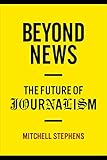Beyond News : The Future of Journalism / Mitchell Stephens.
Material type: TextSeries: Columbia Journalism Review BooksPublisher: New York, NY : Columbia University Press, [2014]Copyright date: ©2014Edition: Pilot project,eBook available to selected US libraries onlyDescription: 1 online resource (264 p.)Content type:
TextSeries: Columbia Journalism Review BooksPublisher: New York, NY : Columbia University Press, [2014]Copyright date: ©2014Edition: Pilot project,eBook available to selected US libraries onlyDescription: 1 online resource (264 p.)Content type: - 9780231159388
- 9780231536295
- 070.4 23
- PN4815.2 .S48 2014
- PN4815.2 .S48 2014
- online - DeGruyter
- Issued also in print.
| Item type | Current library | Call number | URL | Status | Notes | Barcode | |
|---|---|---|---|---|---|---|---|
 eBook
eBook
|
Biblioteca "Angelicum" Pont. Univ. S.Tommaso d'Aquino Nuvola online | online - DeGruyter (Browse shelf(Opens below)) | Online access | Not for loan (Accesso limitato) | Accesso per gli utenti autorizzati / Access for authorized users | (dgr)9780231536295 |
Frontmatter -- Contents -- Introduction: Quality Journalism Reconsidered -- 1. "Principles, Opinions, Sentiments, And Affections" -- 2. "Yesterday's Doings in All Continents" -- 3. "Circulators of Intelligence Merely" -- 4. "Bye-Bye to the Old 'Who-What-When-Where' " -- 5. "Much as One May Try to Disappear from the Work" -- 6. "The World's Immeasurable Babblement" -- 7. "Shimmering Intellectual Scoops" -- Notes -- Acknowledgments -- Index
restricted access online access with authorization star
http://purl.org/coar/access_right/c_16ec
For a century and a half, journalists made a good business out of selling the latest news or selling ads next to that news. Now that news pours out of the Internet and our mobile devices-fast, abundant, and mostly free-that era is ending. Our best journalists, Mitchell Stephens argues, instead must offer original, challenging perspectives-not just slightly more thorough accounts of widely reported events. His book proposes a new standard: "wisdom journalism," an amalgam of the more rarified forms of reporting-exclusive, enterprising, investigative-and informed, insightful, interpretive, explanatory, even opinionated takes on current events.This book features an original, sometimes critical examination of contemporary journalism, both on- and offline, and it finds inspiration for a more ambitious and effective understanding of journalism in examples from twenty-first-century articles and blogs, as well as in a selection of outstanding twentieth-century journalism and Benjamin Franklin's eighteenth-century writings. Most attempts to deal with journalism's current crisis emphasize technology. Stephens emphasizes mindsets and the need to rethink what journalism has been and might become.
Issued also in print.
Mode of access: Internet via World Wide Web.
In English.
Description based on online resource; title from PDF title page (publisher's Web site, viewed 02. Mrz 2022)


